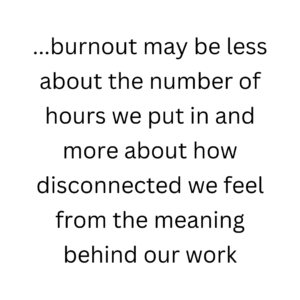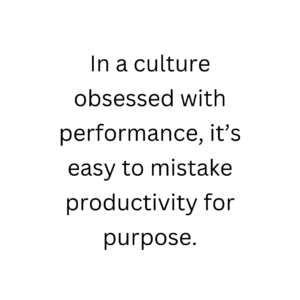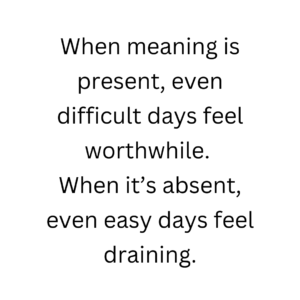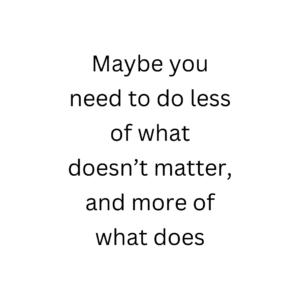
A Crisis of Meaning: Why Burnout Is About More Than Just Overwork
We typically blame burnout on having too much to do, and so in response we engage in self-care to counter the negative impact. Too many emails? Take a warm bath. Back-to-back meetings? Light a candle and meditate. Feeling tired? Take a vacation. These are all fine, and self-care is certainly important, but what if burnout isn’t just about being overworked?
What if it’s about being under-fulfilled?
 Emerging research suggests that burnout may be less about the number of hours we put in and more about how disconnected we feel from the meaning behind our work (Messias et al., 2021).
Emerging research suggests that burnout may be less about the number of hours we put in and more about how disconnected we feel from the meaning behind our work (Messias et al., 2021).
Studies have consistently shown that measures of meaningful work and purpose in life correlate inversely with burnout (Southwick, et al., 2021; Tomic & Tomic, 2008). For example, research using instruments such as the Maslach Burnout Inventory, Work as Meaning Inventory (Steger & Dik, 2008), and related scales report that higher endorsement of existential fulfillment or increased time devoted to meaningful tasks correlate with lower burnout risk and lower ratings of current burnout.
Burnout Isn’t Just Fatigue, It Might Be a Sign of Disconnection
Burnout is classically defined by emotional exhaustion, cynicism or depersonalization, and a reduced sense of accomplishment, even when we work really hard. It’s that feeling of dread when the weekend comes to an end, the dragging yourself to work, questioning whether anything you do matters, and counting down the minutes until the day ends, even if the day just started.
 But here’s the deeper truth - many of us are burned out not because we work too hard, but because our work feels disconnected from who we are.
But here’s the deeper truth - many of us are burned out not because we work too hard, but because our work feels disconnected from who we are.
When we report higher levels of meaning, purpose, or existential fulfillment, we are significantly less likely to experience burnout. These findings are true across professions and countries, from teachers in Israel (Pines, 2004) to mental health professionals in Hong Kong (Yiu-kee & Tang, 1995), clergy in the U.S. and Italy (Crea & Francis, 2022), and healthcare workers globally (Messias et al., 2021).
When we feel that our work has meaning, we’re more resilient. When we don’t, even an easy job can leave us feeling depleted.
Value Incongruence and Energy Drain
There’s a kind of tiredness that rest alone can’t resolve. It’s not just physical—it’s psychological and emotional.
This deeper fatigue often arises when the tasks that fill your day feel misaligned with what you truly care about. Psychologists refer to this as value incongruence, a mismatch between your personal values and the expectations or culture of your workplace. Research shows this misalignment is a strong predictor of burnout (Hossli, Natter, & Algesheimer, 2024).
Consider a therapist who values deep connection but is forced to rush through 15-minute intakes. Or a teacher who thrives on creativity but is constrained by rigid testing standards that quantify every student. Or a nurse who believes in holistic care but spends most of their day documenting rather than connecting with patients. Over time, these small but persistent mismatches can erode motivation, engagement, and energy.
We may still show up, complete tasks, and meet deadlines. But inside, a slow disconnect begins to form, diminishing our sense of purpose, authenticity, and fulfillment.
Productivity ≠ Purpose
 In a culture obsessed with performance, it’s easy to mistake productivity for purpose. If we’re hitting goals and staying busy, surely we must be doing something right… right?
In a culture obsessed with performance, it’s easy to mistake productivity for purpose. If we’re hitting goals and staying busy, surely we must be doing something right… right?
Not necessarily.
You can be incredibly productive and deeply burned out. In fact, research suggests that people who are high-achieving and driven are especially vulnerable to burnout when their work becomes static (Altikulac, S. et al., 2024). It’s not that they can’t handle hard work, it’s that they can’t handle pointless work.
This is why some of the most burnt-out individuals are not the ones doing the most work, but the ones doing the most empty work. Endless documentation. Meetings that go nowhere. Tasks that serve systems, not people. Emails that continue to crowd your inbox, even when you are not at work.
And social media doesn’t help. We scroll past images of people living their dream or making six figures before they turn 30, and we wonder why our own accomplishments feel hollow. To quote Forbes Women, "We compare our behind-the-scenes to everyone else’s highlight reel and wonder if we’re the problem" (Kerpen, 2017).
We are not. You are not.
Meaning is a Burnout Buffer
So what can we do? While we can’t always change our jobs or change our responsibilities overnight, we can begin to reconnect with what gives our work meaning, and that connection may be one of the most powerful counters to burnout.
 From an existential psychology perspective, meaning isn’t a luxury—it’s a psychological need. Viktor Frankl, psychiatrist and author of Man’s Search for Meaning, emphasized that those who find a “why” can endure almost any “how.” When our daily work lacks connection to something greater, whether that’s helping others, expressing creativity, or contributing to a cause, we become vulnerable to emptiness, apathy, and burnout. Burnout, in this light, isn’t a failure of endurance; it’s a signal that our life or work has lost alignment with our core values.
From an existential psychology perspective, meaning isn’t a luxury—it’s a psychological need. Viktor Frankl, psychiatrist and author of Man’s Search for Meaning, emphasized that those who find a “why” can endure almost any “how.” When our daily work lacks connection to something greater, whether that’s helping others, expressing creativity, or contributing to a cause, we become vulnerable to emptiness, apathy, and burnout. Burnout, in this light, isn’t a failure of endurance; it’s a signal that our life or work has lost alignment with our core values.
Positive psychology builds on this foundation with an evidence-based approach. Martin Seligman’s PERMA model includes Meaning as one of five core elements of well-being. Research consistently shows that meaning serves as a protective factor, buffering individuals from the emotional toll of stress and monotony. When people view their work as meaningful, something that contributes to a larger purpose or reflects their personal strengths, they experience higher levels of engagement, motivation, and resilience.
What Can We Do?
Burnout is so often found not in those who are overwhelmed by meaningful work, but in those who are disconnected from it. The good news? Small shifts in how we view or approach our work can reignite a sense of purpose.
Here are a few evidence-based ways to reconnect:
Clarify Your Values
What truly matters to you? Autonomy, creativity, service, connection, laughter, learning? Take time to identify your top 3 core values and evaluate whether your current work supports or contradicts them. I wrote an article titled Character Strengths and the Virtuous Life a while back and it may be a good place to start investigating your natural strengths.
Infuse Meaning into the Small Stuff
Even in imperfect environments, you can seek moments that feel authentic. A kind word to a colleague. Helping a client through a challenge. A task completed with care. Meaning is often found in the micro-moments. Martin Seligman once told the story of a woman who worked at a food market and disliked her repetitive job as a cashier. Having a strength in and an enjoyment for social interaction, she made her job a game by asking every customer something about themselves and found that her workday began to zoom by as she found meaning in her work again.
Use Your Strengths Intentionally
Positive psychology emphasizes that using our natural strengths, such as curiosity, compassion, leadership, humor, boosts both performance and well-being. What strengths come naturally to you, and how can you bring them into your daily tasks? And, we tend to perform better at tasks that come naturally for us and who doesn't like to feel like they are doing a good job. It may create an upward spiral that helps you engage other strengths or find new meaning in the work you do.
Set Purposeful Boundaries
Sometimes meaning is found not in doing more, but in doing less of what doesn’t matter. Saying “no” to draining, low-impact tasks can free up space for deeper, values-aligned work. A friend and colleague of mine wears a bracelet that just says "No." It was given to her by a friend who knew her well.
Ask the Bigger Questions
Burnout may be more than a red flag. It may be a turning point that makes yous top and think about where you re and where you want to be. What kind of work do you want to be doing five years from now? How do you want to feel at the end of the day? What kind of impact do you want to have? You can think about adding meaning to your work now but also think about where your career is headed and how it fits with your strengths and values.
We know that when meaning is present, even difficult days feel worthwhile. When it’s absent, even easy days feel draining. Meaning isn’t a soft skill—it is a psychological buffer that helps us persist, recover, grow, and thrive.
Final Thoughts: Burnout Isn’t a Weakness
If you're feeling drained, disillusioned, or defeated, not just tired, but disconnected, it may not be because you're broken. It may be because something essential is missing: meaning.
 Burnout isn't just about doing too much. It's about doing too much that doesn’t matter to you. And while the world often urges us to push harder, sometimes the braver and wiser choice is to pause, reflect, and begin again with purpose.
Burnout isn't just about doing too much. It's about doing too much that doesn’t matter to you. And while the world often urges us to push harder, sometimes the braver and wiser choice is to pause, reflect, and begin again with purpose.
Maybe you don’t need to do less.
Maybe you need to do less of what doesn’t matter, and more of what does—
More of what aligns with your values.
More of what makes you feel connected.
More of what brings meaning to your work and your life.
More Information at AllPsych.com
Headed for Burnout? Watch for these Top Signs
Well-Being and the Five 'Happy' Lives
Modernizing Maslow's Hierarchy through the Lens of Self-Care
References
Altikulac, S., Janssen, T. W. P., Yu, J., Nieuwenhuis, S. & Van Atteveldt, N. M. (2024). Mindset profiles of secondary school students: Associations with academic achievement, motivation and school burnout symptoms. British Journal of Education. 97(3), 738-758. https://doi.org/10.1111/bjep.12676
Crea, G. and Francis, Leslie J. (2022). Purpose in life as protection against professional burnout among Catholic priests and religious in Italy : testing the insights of logotherapy. Pastoral Psychology, 71, 471-483. doi:10.1007/s11089-022-01009-z
Hossli, N., Natter, M., & Algesheimer, R. (2024). On the importance of congruence between personal and work values – How value incongruence affects job satisfaction: A multiple mediation model. International Journal of Wellbeing, 14(3), 2905, 1-18. https://doi.org/10.5502/ijw.v14i3.2905
Kerpen, C. (2017). Stop comparing your behind-the-scenes with everyone's highlight reel. Forbes. Retrieved from https://www.forbes.com/sites/carriekerpen/2017/07/29/stop-comparing-your-behind-the-scenes-with-everyones-highlight-reel/
Messias, E., Flynn, V., Gathright, M., Thrush, C., Atkinson, T., & Thapa, P. (2021). Loss of meaning at work associated with burnout risk in academic medicine. Southern Medical Journal, 114(3),139-143. DOI 10.14423/SMJ.0000000000001220
Southwick, S., Wisneski, L., & Starck, P. (2021). Rediscovering meaning and purpose: An approach to burnout in the time of COVID-19 and beyond. The American Journal of Medicine, 134(9), 1065-1067.
Steger, M. & Dik, B. J. (2008). Measuring meaningful work: The work as Meaning Inventory. Journal of Career Assessment, 20(3), 322-337. DOI:10.1177/1069072711436160
Tomic, W. & Tomic, E. (2008). Existential fulfilment and burnout among principles and teachers. Journal of Beliefs and Values: Studies in Religion & Education, 29(1). https://doi.org/10.1080/13617670801928191
Yiu-kee, C., & Tang, C. S.-k. (1995). Existential correlates of burnout among mental health professionals in Hong Kong. Journal of Mental Health Counseling, 17(2), 220–229.
